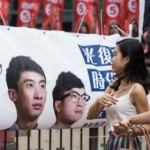On September 4, Hong Kong voted for its Legislative Council, its main legislative body. This has come after a year of significant developments: the trial and sentencing of student activists; the announcement of multiple challengers to current Chief Executive CY Leung; and the rise of a pro-independence movement.
The biggest story of these elections are the eight seats won by fairly radical activists, including three seats won by pro-independence parties.[1] The balance of power in the Legislative Council remains the same, however, which means that these more radical candidates have taken seats from more moderate pro-democracy candidates.
A quick primer: the Legislative Council is chosen by democratic election. However, seats are not solely apportioned by proportional representation or “first-past-the-post”, but by a complex hybrid of the two. Geographical constituencies choose their representatives by proportional representation. But Hong Kong also has “functional constituencies,” where professions elect a representative according to “first-past-the-post.” Those who do not belong to one of the recognised professions can vote for one of the five ‘Super Seats’, with candidates chosen from the local advisory District Councils. Together, this makes 70 seats, which constitute the Legislative Council.[2]
The Council has two ‘camps’: the “establishment”—usually pro-business and pro-Beijing; and the “pan-democrats”—a collection of over a dozen parties that support greater democracy and civil rights in Hong Kong, and often also support greater social welfare and economic regulation.
A students’ movement has been growing in Hong Kong since the 2012 debate over “national education”. This was an attempt to start a class in schools about the history and political system of Mainland China that, depending on one’s political orientation, was either a necessary reminder of Hong Kong’s Chinese links or an attempt by Beijing to brainwash Hong Kong’s youth.
Student activists also played a major role in the protests against the establishment and Beijing’s proposed electoral reforms for choosing Hong Kong’s Chief Executive. The decision to institute a ‘nominating committee’ to manage candidates drew the ire of pro-democracy and student activists. Mass protests ultimately succeeded in blocking the reform package.
All the student activists are “radical” in that they favour constitutional reform in support of greater democracy in Hong Kong. However, their political positions on this vary. Activists like Nathan Law (just elected Hong Kong’s youngest member of the Legislative Council), while calling for significantly greater autonomy for Hong Kong, are not asking for the complete rejection of China.
But a growing number of students are now indeed advocating total independence from the Mainland—three of these “localist” activists also won seats in the recent election. The opposition camp is now almost evenly split between the longer-established, relatively moderate pro-democracy parties, and the more radical activists.
The rise of the localist movement has changed much of Hong Kong’s politics. The commemoration of the 1989 Tiananmen massacre, a touchstone of protests in the city, is now seen by some independence activists as a dangerous expression of Chinese “nationalist sentiment.” The Hong Kong government, which has long refused to comment on the commemoration, broke its silence earlier this year when CY Leung (a de facto member of the pro-Beijing establishment) said that events like the June 4 vigil reminded the people of Hong Kong that they were connected to the mainland.[3]
Prior to the recent election, the government had taken several measures against some of the student activists. A few major pro-independence candidates were barred from running. The Electoral Affairs Commission argued that these candidates would not be able to uphold the Basic Law (Hong Kong’s Constitution, which states that the city is a part of China). The government also charged (the relatively moderate) Nathan Law with “unlawful assembly”; he was found guilty, but a light sentence of community service allowed him to run for office.
These moves seem to have backfired, considering that a number of activists won in Sunday’s election. But it remains unclear how these elections will affect Hong Kong’s politics in the short term. The Legislative Council was already gridlocked, with the opposition camp blocking most of the bills proposed by the government. People are now looking to 2017, when the 1,200-member Election Committee will decide whether to re-elect the unpopular CY Leung.
Instead, these elections may be the first real indication of the strength of the student activists. Their electoral success—the “radical” camp won just over 6,00,000 of the record 2.2 million votes cast—means that their view resonates with a significant part of Hong Kong’s population. And the victories by pro-independence candidates indicate that some voters support a rejection of China (at least symbolically). It is therefore likely that Hong Kong’s politics will remain divided in the near future.
Nicholas Gordon is a researcher at the Global Institute for Tomorrow in Hong Kong. He was a research intern at Gateway House in the summer of 2014. The views expressed here are his own.
This article was exclusively written for Gateway House: Indian Council on Global Relations. You can read more exclusive content here.
For interview requests with the author, or for permission to republish, please contact outreach@gatewayhouse.in.
© Copyright 2016 Gateway House: Indian Council on Global Relations. All rights reserved. Any unauthorized copying or reproduction is strictly prohibited
References
[1] BBC News, ‘Hong Kong election: Who are the new faces in politics?’, BBC, 6 September, 2016, <http://www.bbc.com/news/world-asia-china-37274159> (Accessed 9 September, 2016).
[2] Hong Kong Free Press, ‘Final election results are in – Opposition parties gain 3 more seats in legislature’, Hong Kong Free Press, 5 September, 2016, <https://www.hongkongfp.com/2016/08/27/the-complex-design-of-hong-kongs-legislative-elections-ensure-that-nothing-will-change/> (Accessed on 9 September, 2016).
[3] Phila Sui, ‘‘Connected by Blood’: Leung Chun-ying says Hongkongers should care about mainland issues like Tiananmen Square’, South China Morning Post, 31 May, 2016, <http://www.scmp.com/news/hong-kong/politics/article/1960310/connected-blood-leung-chun-ying-says-hongkongers-should-care> (Accessed 9 September, 2016).


